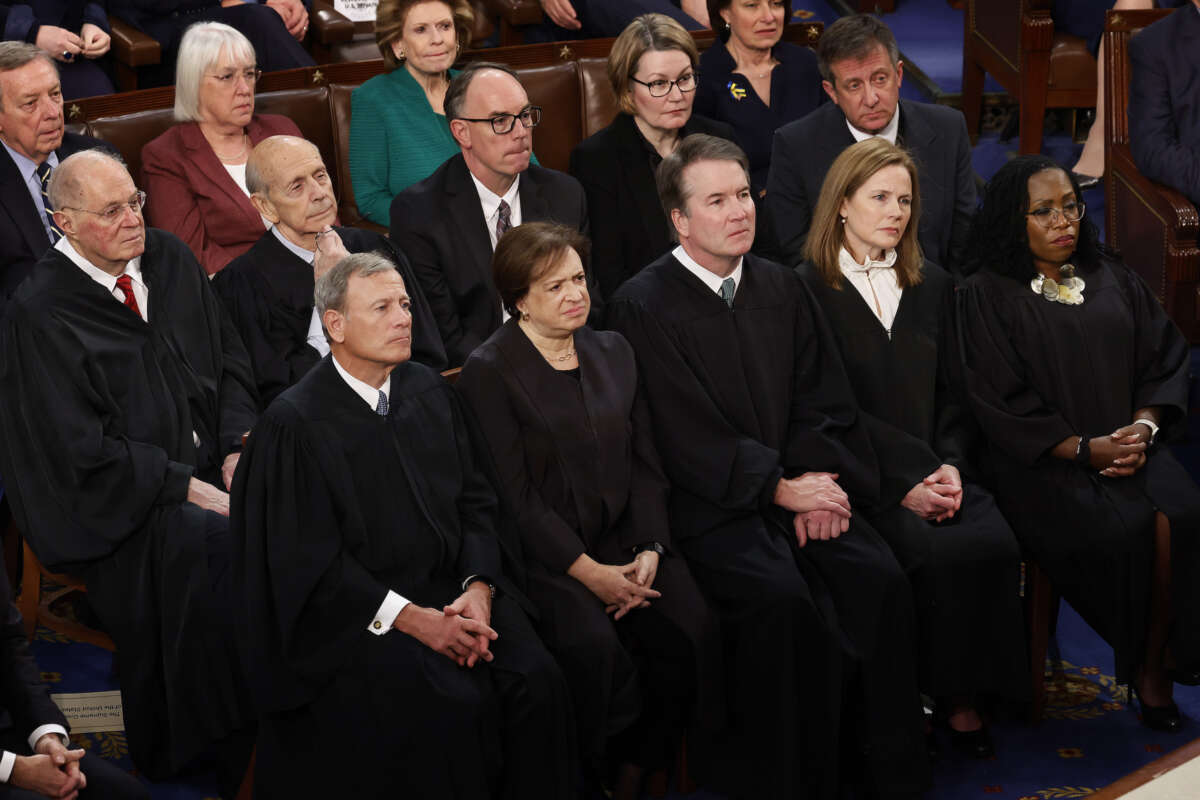A new analysis of financial disclosures shows that the majority of the nine justices on the Supreme Court are multimillionaires due in large part to their ability to leverage their power and connections to gain wealth on the bench, raising questions about corruption on the High Court as a scandal surrounding Justice Clarence Thomas’s financial disclosures unfolds.
According to a report looking at 2021 financial disclosures by Bloomberg, at least six of the justices on the Supreme Court are multimillionaires, putting them in the top 10 percent of wealth in the U.S. The analysis shows that the justices have a combined net worth of between $24 million and $68 million — excluding the value of personal residences or their retirement accounts, which are often the largest assets people own, and which justices are not required to list.
The wealthiest justice, according to disclosures, is Chief Justice John Roberts — the person charged with overseeing the entire federal judicial system, including other justices. Roberts has between $9 million and $27 million in assets, the publication found, including properties in the U.S. and abroad, as well as stocks in telecom company Charter Communications and lab instrument company Thermo Fisher Scientific Inc. This does not include his personal residence in Maryland, which Zillow estimates is worth around $2.2 million.
Justices Neil Gorsuch, Samuel Alito, Amy Coney Barrett, Elena Kagan and Sonia Sotomayor have also reported being multimillionaires, the report finds. Thomas — who has come under high scrutiny for his failure to report several sources of income over the years and connections to conservative billionaire Harlan Crow — appeared to have reported having a maximum of several million dollars in assets, though it’s now been documented that he has a pattern of omitting assets from financial disclosures, which experts say is illegal.
Justices make a hefty salary, though Bloomberg notes it is far less than they would make in private practice; Roberts collects a salary of nearly $300,000 annually, while the rest of the bench is paid $285,300. But the justices’ wealth appears to be supplemented by other sources of wealth that may be preventing them from ruling fairly on issues that affect the majority of Americans who are less wealthy than they are.
Like Roberts, many justices — who often rule on decisions that affect private companies and their profit margins — own individual stocks. Alito, who reported having assets worth between $2.9 million and $7.4 million, has recused himself from cases related to his ownership of stocks in Johnson and Johnson and Exxon Mobil, for instance, though progressive advocates have pointed out that Alito often rules on cases that may affect Exxon indirectly.
Other sources of wealth are also potentially posing conflicts of interest for justices — and experts say that the very fact that they’re wealthy could also be swaying their decisions unfairly. Kagan and Sotomayor are landlords, for instance, which could have affected the High Court’s decision to strike down Joe Biden’s eviction moratorium; though Kagan and Sotomayor both ruled to uphold the moratorium, their positions as landlords could have weakened their will to convince other justices to join their side.
One major source of wealth is justices’ book deals. Barrett, Gorsuch and Sotomayor have each gotten hundreds of thousands of dollars in royalties for their books, after receiving over $1 million advances; these books are often written after they are confirmed to the Supreme Court, suggesting that the deals were struck with their positions of power in mind.
This accumulation of wealth appears to be totally legal. The Supreme Court is the only court in the country not bound to a code of ethics, which reform advocates have long said has opened the door to widespread corruption among one of the most powerful institutions in the U.S.
Join us in defending the truth before it’s too late
The future of independent journalism is uncertain, and the consequences of losing it are too grave to ignore. To ensure Truthout remains safe, strong, and free, we need to raise $43,000 in the next 6 days. Every dollar raised goes directly toward the costs of producing news you can trust.
Please give what you can — because by supporting us with a tax-deductible donation, you’re not just preserving a source of news, you’re helping to safeguard what’s left of our democracy.
